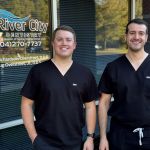The Role of a Dentist in Managing Sleep Apnea
- 1. Understanding Sleep Apnea
- 2. Dental Interventions for Sleep Apnea
- 3. How Dentists Diagnose Sleep Apnea
- 4. Benefits of Dental Treatment for Sleep Apnea
- 5. Case Study: Dental Treatment Success
- 6. Why Choose Dentistry Toothtruth for Your Sleep Apnea Treatment
1. Understanding Sleep Apnea
Sleep apnea is a serious sleep disorder that occurs when a person’s breathing is interrupted during sleep. This condition can lead to fragmented sleep, and it may result in various health problems like heart disease, stroke, and high blood pressure. The most common type is obstructive sleep apnea (OSA), where the muscles in the throat relax excessively and block the airway.
Though sleep apnea is often managed with CPAP machines or lifestyle changes, there is a growing role for dental professionals in helping patients manage this condition. Dentists can play a crucial role in diagnosing and treating sleep apnea, offering patients an alternative to traditional treatment options.
2. Dental Interventions for Sleep Apnea
One of the primary dental interventions for sleep apnea is the use of oral appliances, also known as mandibular advancement devices (MADs). These devices are custom-made by dentists and are designed to reposition the lower jaw and tongue to keep the airway open during sleep. This non-invasive treatment is particularly effective for mild to moderate cases of obstructive sleep apnea and is often recommended for patients who cannot tolerate CPAP therapy.
Another intervention includes continuous positive airway pressure (CPAP) therapy, where dentists help ensure the right fit and comfort of the mask to enhance patient compliance. Dentists may also collaborate with other healthcare providers, such as sleep specialists, to determine the best course of treatment.
3. How Dentists Diagnose Sleep Apnea
Dentists are increasingly becoming the first line of defense in diagnosing sleep apnea. Through routine dental check-ups, dentists may notice signs such as worn teeth from grinding, dry mouth, and enlarged tonsils, which can be indicative of sleep apnea.
If sleep apnea is suspected, dentists may refer patients to sleep specialists for a formal diagnosis. However, many dentists are now trained to conduct sleep screenings, utilizing tools such as the Epworth Sleepiness Scale and home sleep apnea tests (HSATs), which allow for preliminary assessments in the comfort of a patient’s home.
4. Benefits of Dental Treatment for Sleep Apnea
There are several key benefits of seeking dental treatment for sleep apnea:
- Non-invasive options: Oral appliances are a non-invasive treatment that may be preferred by patients who are uncomfortable with CPAP machines.
- Improved comfort: Custom-made devices are designed to fit comfortably, reducing the need for ongoing adjustments.
- Enhanced sleep quality: By keeping the airway open, dental interventions improve sleep quality, leading to better overall health.
- Better compliance: Many patients find dental devices easier to use consistently compared to CPAP therapy, leading to improved treatment outcomes.
5. Case Study: Dental Treatment Success
Consider the case of Sarah, a 45-year-old woman diagnosed with moderate obstructive sleep apnea. Sarah had been using a CPAP machine for several months but found it uncomfortable and difficult to comply with nightly. After consulting with her dentist at Dentistry Toothtruth, Sarah was fitted with a mandibular advancement device. Within weeks, she reported feeling more rested, with fewer episodes of choking during the night. This success story highlights the potential of dental treatments to effectively manage sleep apnea.
6. Why Choose Dentistry Toothtruth for Your Sleep Apnea Treatment
If you're struggling with sleep apnea, Dentistry Toothtruth is here to provide you with personalized care. Our team of experienced professionals offers a range of dental treatments to manage sleep apnea, from custom-made oral appliances to CPAP management. We understand the importance of quality sleep and are dedicated to helping you achieve better health.
Learn more about how Dentistry Toothtruth can help you manage sleep apnea. Visit Dentistry Toothtruth to schedule a consultation today!







 Parkside Dental & Implant Center4.0 (80 review)
Parkside Dental & Implant Center4.0 (80 review) Virginia Family Dentistry Mechanicsville4.0 (808 review)
Virginia Family Dentistry Mechanicsville4.0 (808 review) River City Dentistry5.0 (329 review)
River City Dentistry5.0 (329 review) John U Choi DDS, PhD4.0 (6 review)
John U Choi DDS, PhD4.0 (6 review) Tri-City Smiles Dentistry and Orthodontics4.0 (180 review)
Tri-City Smiles Dentistry and Orthodontics4.0 (180 review) Rosedale Dental: CJ Jang, DDS4.0 (35 review)
Rosedale Dental: CJ Jang, DDS4.0 (35 review) The Importance of Oral Health Education During Pregnancy for a Healthy Pregnancy
The Importance of Oral Health Education During Pregnancy for a Healthy Pregnancy Best Tips for Brushing Your Teeth Properly for Healthy Gums: Essential Techniques for Oral Health
Best Tips for Brushing Your Teeth Properly for Healthy Gums: Essential Techniques for Oral Health Why Skipping Dental Checkups Can Lead to Bigger Oral Health Problems
Why Skipping Dental Checkups Can Lead to Bigger Oral Health Problems Advantages of Porcelain Dental Restorations
Advantages of Porcelain Dental Restorations How Can Diabetes Cause Tooth and Gum Problems? Preventing and Managing Oral Health Issues
How Can Diabetes Cause Tooth and Gum Problems? Preventing and Managing Oral Health Issues Healthy Habits for Promoting Good Oral Health and Hygiene: Tips for a Healthy Smile
Healthy Habits for Promoting Good Oral Health and Hygiene: Tips for a Healthy Smile